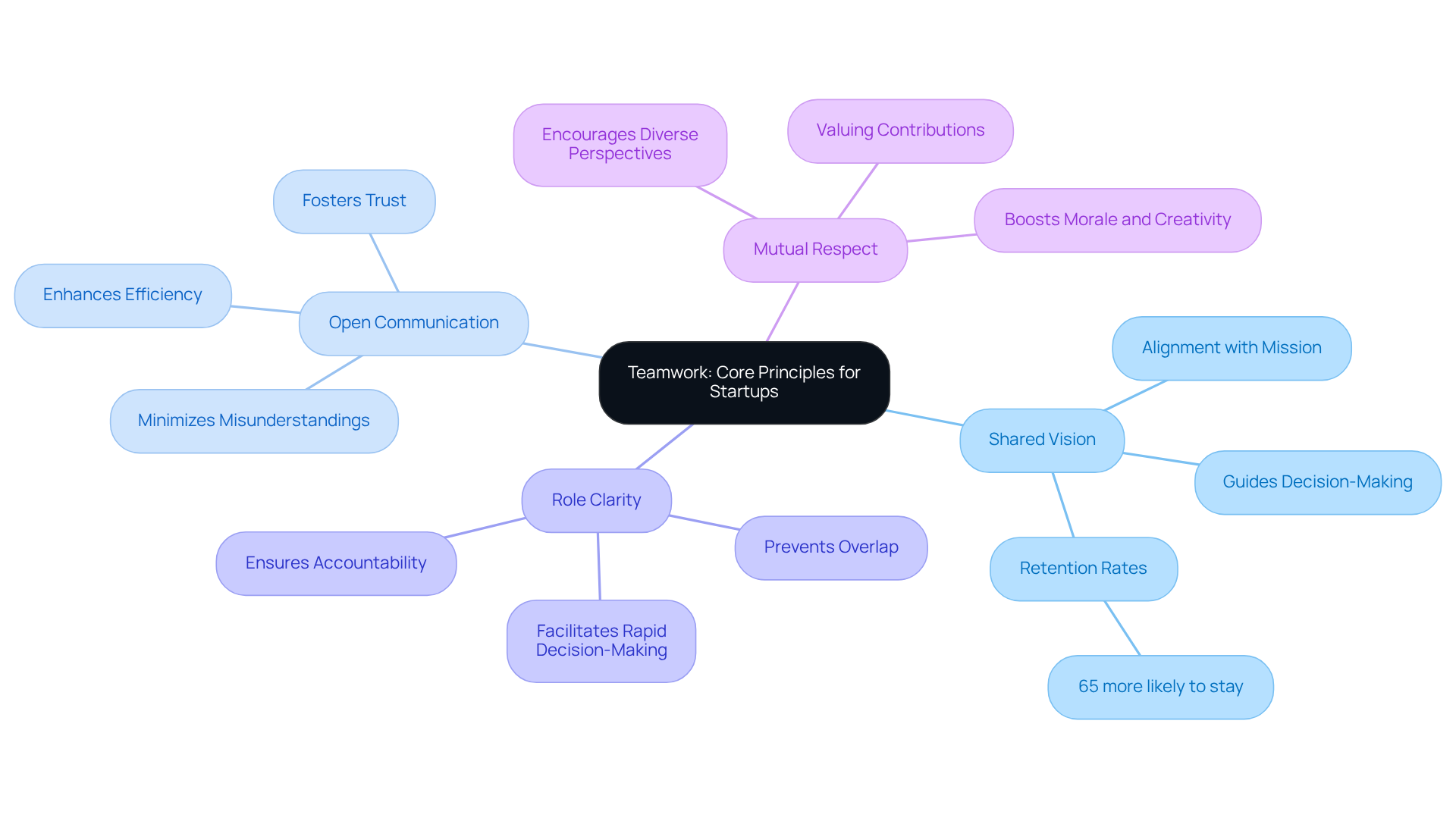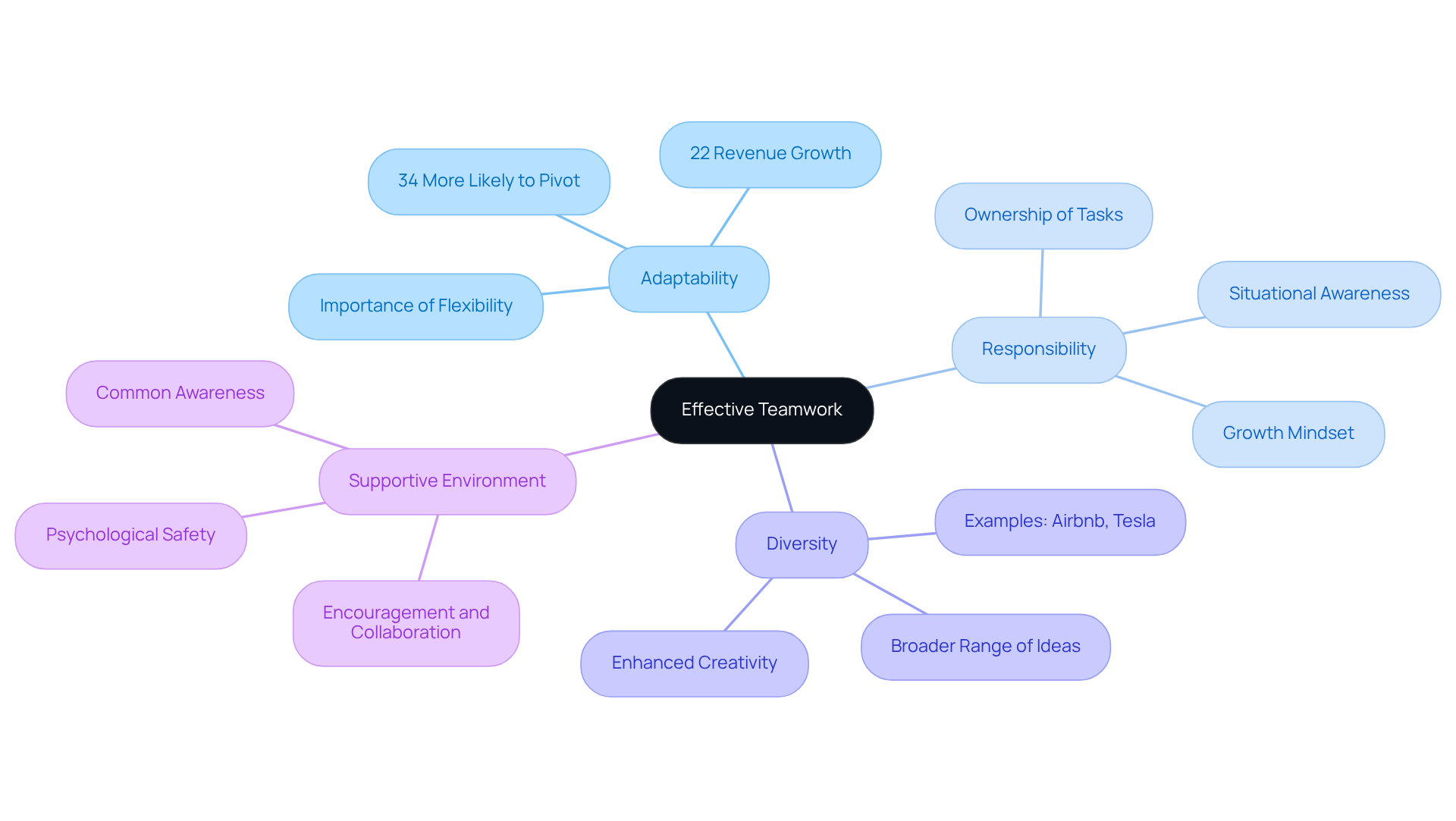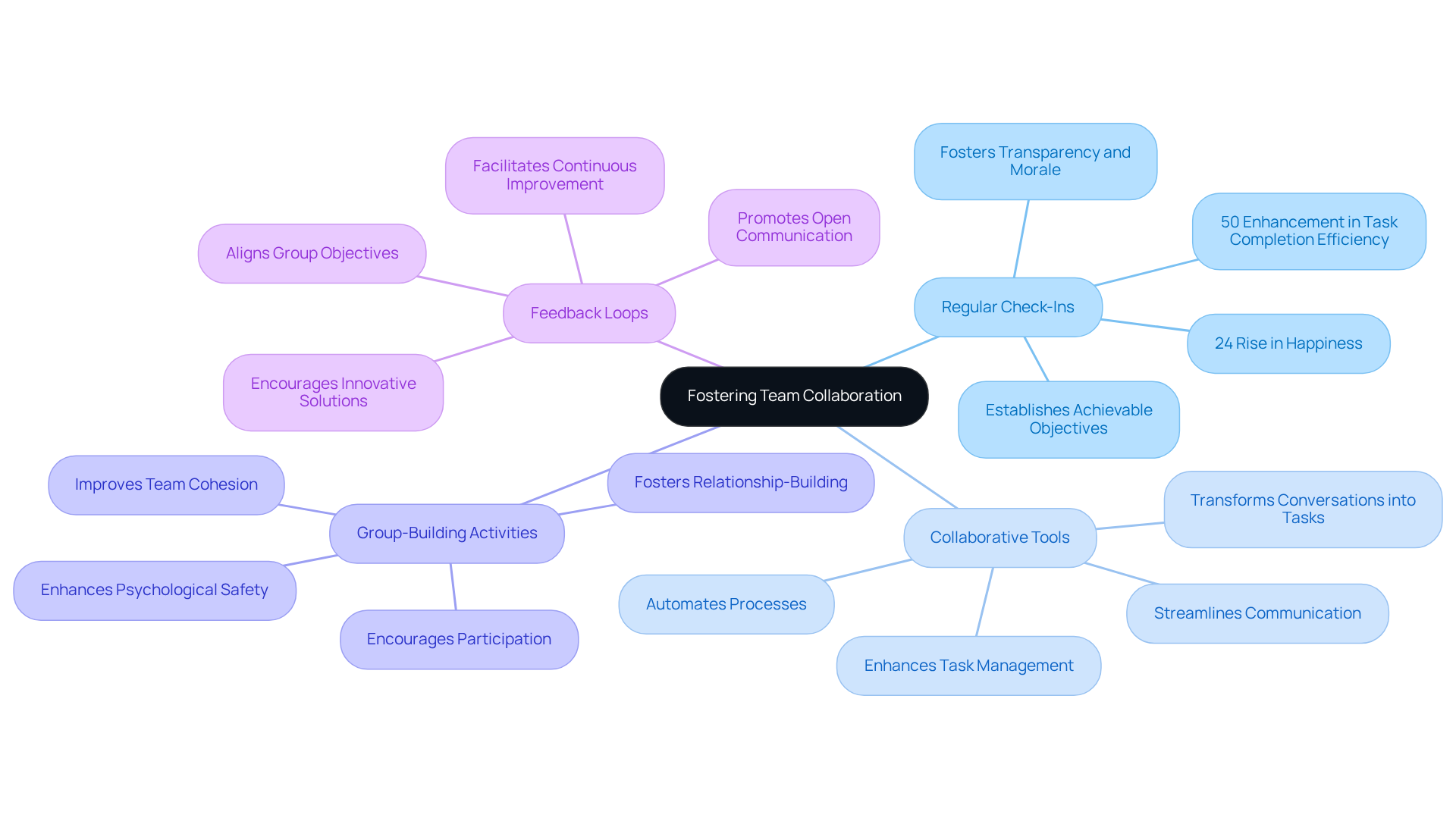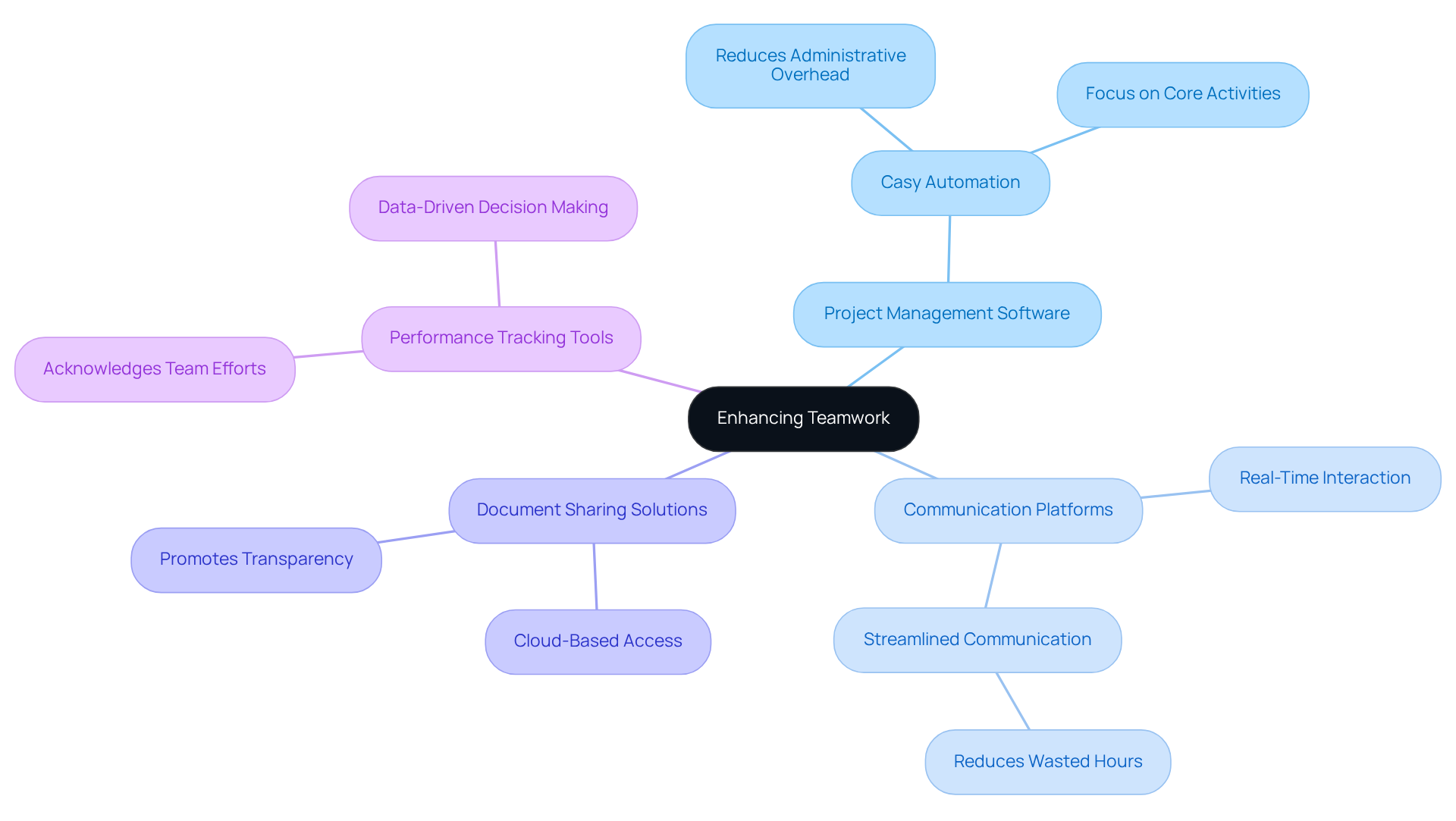Overview
Effective teamwork in startups is fundamentally rooted in principles such as:
- Shared vision
- Open communication
- Role clarity
- Mutual respect
These elements collectively create a collaborative and productive environment. Notably, these principles not only enhance team dynamics and spur innovation but also significantly impact employee retention and overall business success. This is evidenced by various studies and real-world examples from successful companies, underscoring the critical importance of fostering such an environment.
Introduction
In the fast-paced world of startups, fostering exceptional teamwork can distinguish success from failure. With collaboration, communication, and a shared vision at the forefront, teams unlock their potential and drive innovation. Yet, many startups grapple with implementing effective teamwork strategies.
What core principles can transform a group of individuals into a cohesive unit? By exploring essential characteristics and actionable strategies for enhancing teamwork, we uncover not only the benefits but also the challenges that new ventures must navigate to thrive in a competitive landscape.
Define Teamwork: Core Principles for Startups
In the entrepreneurial landscape, great teamwork is essential and hinges on collaboration, communication, and a unified commitment to shared objectives. Key principles include:
- Shared Vision: It is essential for all team members to understand and align with the startup's mission and objectives. A clear vision not only guides decision-making but also enhances group cohesion. Notably, new hires who collaborate on projects are 65% more likely to remain with the company long enough for it to reach profitability.
- Open Communication: Cultivating transparency and providing regular updates fosters trust and minimizes misunderstandings. Leaders should focus on embodying their vision rather than merely persuading others, as this builds a foundational trust crucial for navigating uncertainties. Enhanced efficiency and reduced costs stem from teams that communicate effectively and resolve issues swiftly.
- Role Clarity: Clearly defined roles and responsibilities prevent overlap and ensure accountability, enabling teams to function efficiently. This clarity is particularly vital in fast-paced environments where rapid decision-making is essential to capitalize on opportunities.
- Mutual Respect: Valuing each team member's contributions elevates morale and encourages diverse perspectives, leading to increased creativity and innovation. A collaborative culture promotes great teamwork, which not only improves team dynamics but also enhances overall productivity.
As Iddris Sandu emphasizes, "This requires a high level of trust and transparent communication." By embedding these principles into their operations, new businesses can establish a robust framework for great teamwork, ultimately driving productivity and fostering innovation. For instance, the case study on "Boosting Retention Rates in New Ventures" illustrates how intentional collaboration across departments enhances employee retention, significantly contributing to the venture's profitability.

Identify Key Characteristics of Effective Teamwork
Effective teamwork in startups hinges on several essential traits:
-
Adaptability: Teams must remain flexible and ready to pivot strategies in response to evolving market conditions. Companies that embed adaptability into their culture have been shown to outperform peers by 22% in annual revenue growth. Furthermore, groups scoring high in adaptability and loyalty metrics were 34% more likely to pivot successfully during crises, highlighting the essential role adaptability plays in navigating challenges.
-
Responsibility: Each group member should take ownership of their tasks and commitments. This sense of responsibility nurtures a culture where individuals are motivated to contribute to the group's objectives, ultimately enhancing performance. As John Estafanous remarked, "When your group has situational awareness during disruptive times and a proper growth mindset of continually seeking improvement, you’ll learn how to turn your setbacks into opportunities for growth."
-
Diversity: A mix of skills and viewpoints within a group significantly enhances creativity and problem-solving abilities. Varied groups are better prepared to tackle challenges and create, as they can draw from a broader range of experiences and ideas. Companies such as Airbnb and Tesla illustrate how varied groups can adjust and succeed in evolving environments.
-
Supportive Environment: Encouraging group members to assist one another cultivates higher morale and collaboration. A culture that promotes psychological safety allows individuals to express their ideas and concerns freely, which fosters great teamwork. Kathleen Sutcliffe highlights that sustaining a common awareness of the group's context is vital for making wise choices and undertaking suitable actions.
By prioritizing these characteristics, new ventures can create a more cohesive and effective group environment, positioning themselves for greater success in a competitive landscape.

Implement Strategies to Foster Team Collaboration
To cultivate effective team collaboration, startups can adopt several key strategies:
-
Regular Check-Ins: Consistent meetings are essential for discussing progress, addressing challenges, and outlining next steps. Did you know that groups with regular check-ins experience a 24% rise in reported happiness and a 50% enhancement in task completion efficiency? These meetings ensure alignment and foster a culture of transparency, which is crucial for maintaining morale and productivity. Furthermore, establishing achievable objectives during these check-ins can improve cooperation and keep participants motivated.
-
Collaborative Tools: Implementing platforms like Casy can significantly enhance task management by automating processes and streamlining communication. Casy's capability to connect with popular chat applications enables groups to transform conversations into actionable tasks effortlessly, decreasing administrative burdens and allowing individuals to concentrate on their primary responsibilities. Additionally, Casy arranges tasks into groups like R&D, Bugs, and In Progress, offering complete transparency for colleagues.
-
Group-Building Activities: Participating in activities that foster relationship-building and trust among group members is essential. Such initiatives, including regular one-on-one meetings, not only improve great teamwork but also foster a supportive environment where employees feel valued and motivated to contribute. Building personal connections fosters psychological safety, which is essential for achieving great teamwork.
-
Feedback Loops: Establishing effective mechanisms for giving and receiving feedback is crucial for ongoing enhancement in group dynamics. Consistent feedback promotes a culture of open communication, enabling individuals to share their ideas and concerns, which can result in innovative solutions and improved collaboration. Furthermore, effectively conveying goals to group participants fosters active involvement and alignment with the group's objectives.
By applying these strategies, startups can enable their groups to operate more efficiently and effectively, ultimately driving success in their projects.

Utilize Tools and Technologies to Enhance Teamwork
Startups can significantly enhance great teamwork by leveraging a variety of tools and technologies.
-
Project Management Software: Casy automates task creation and updates, ensuring team members remain informed without the burden of manual input. This automation reduces administrative overhead, allowing teams to focus on their core activities and enhancing overall productivity.
-
Communication Platforms: Incorporating chat tools such as Slack or Telegram enables real-time interaction and teamwork. Research shows that organizations using effective communication platforms waste around 25 billion hours each year because of ineffective teamwork, emphasizing the necessity for streamlined communication. As Jack Welch noted, good business leaders create and passionately drive a vision to completion, which is essential for achieving great teamwork.
-
Document Sharing Solutions: Cloud-based platforms facilitate easy access to shared documents and resources, promoting transparency and cooperation among group members. This accessibility is crucial for maintaining alignment and ensuring everyone is on the same page, as it fosters a culture of openness and shared responsibility.
-
Performance Tracking Tools: Implementing systems to monitor group performance and progress towards goals allows for data-driven decision-making. Organizations that emphasize great teamwork are five times more likely to be viewed as high-performing, highlighting the significance of monitoring and acknowledging group efforts. As Amy Poehler mentioned, collaboration improves the success of projects, underscoring the importance of great teamwork in new ventures.
By adopting these tools, startups can foster a more efficient and collaborative work environment, ultimately driving better results and enhancing team dynamics.

Conclusion
Achieving great teamwork in startups is not merely a beneficial attribute; it is a fundamental necessity for success. By establishing a shared vision, fostering open communication, ensuring role clarity, and cultivating mutual respect, startups can create an environment where collaboration thrives. These core principles align team members towards common goals, ultimately enhancing productivity and innovation.
Key characteristics such as adaptability, responsibility, diversity, and a supportive environment are vital traits for effective teamwork. Each of these elements contributes to a cohesive team dynamic, enabling startups to navigate challenges and seize opportunities in a competitive landscape. Implementing strategies like:
- Regular check-ins
- Utilizing collaborative tools
- Engaging in group-building activities
- Establishing feedback loops
can further enhance collaboration and efficiency among team members.
Reflecting on the significance of these insights, it becomes clear that successful teamwork is the backbone of any thriving startup. By prioritizing these principles and strategies, entrepreneurs can improve team dynamics and drive their ventures toward sustained success. Embracing the importance of teamwork in startups is not just an option; it is a strategic imperative that can lead to remarkable outcomes in both employee satisfaction and overall business performance.
Frequently Asked Questions
What are the core principles of teamwork for startups?
The core principles of teamwork for startups include shared vision, open communication, role clarity, and mutual respect.
Why is a shared vision important for a startup team?
A shared vision is crucial as it helps all team members understand and align with the startup's mission and objectives, guiding decision-making and enhancing group cohesion.
How does open communication benefit a startup team?
Open communication fosters transparency, builds trust, minimizes misunderstandings, and enhances efficiency by allowing teams to resolve issues swiftly.
What role does clarity in roles and responsibilities play in teamwork?
Clearly defined roles and responsibilities prevent overlap and ensure accountability, enabling teams to function efficiently, especially in fast-paced environments.
How does mutual respect impact team dynamics?
Valuing each team member's contributions elevates morale, encourages diverse perspectives, and leads to increased creativity and innovation, ultimately enhancing overall productivity.
What is the significance of trust and transparent communication in teamwork?
Trust and transparent communication are essential for navigating uncertainties and establishing a robust framework for teamwork, driving productivity and fostering innovation.
Can you provide an example of effective teamwork in startups?
The case study on 'Boosting Retention Rates in New Ventures' illustrates that intentional collaboration across departments enhances employee retention, significantly contributing to the venture's profitability.




